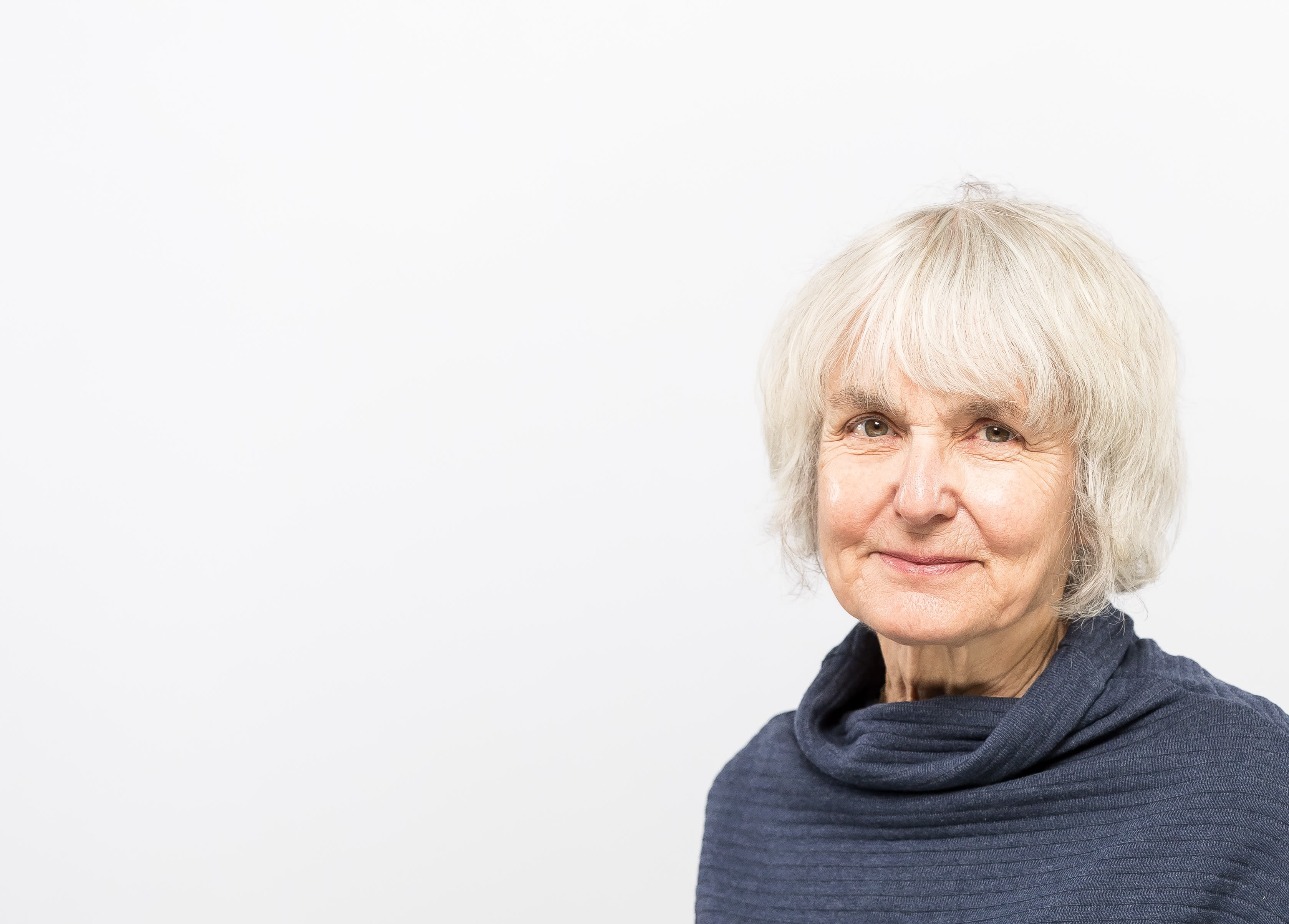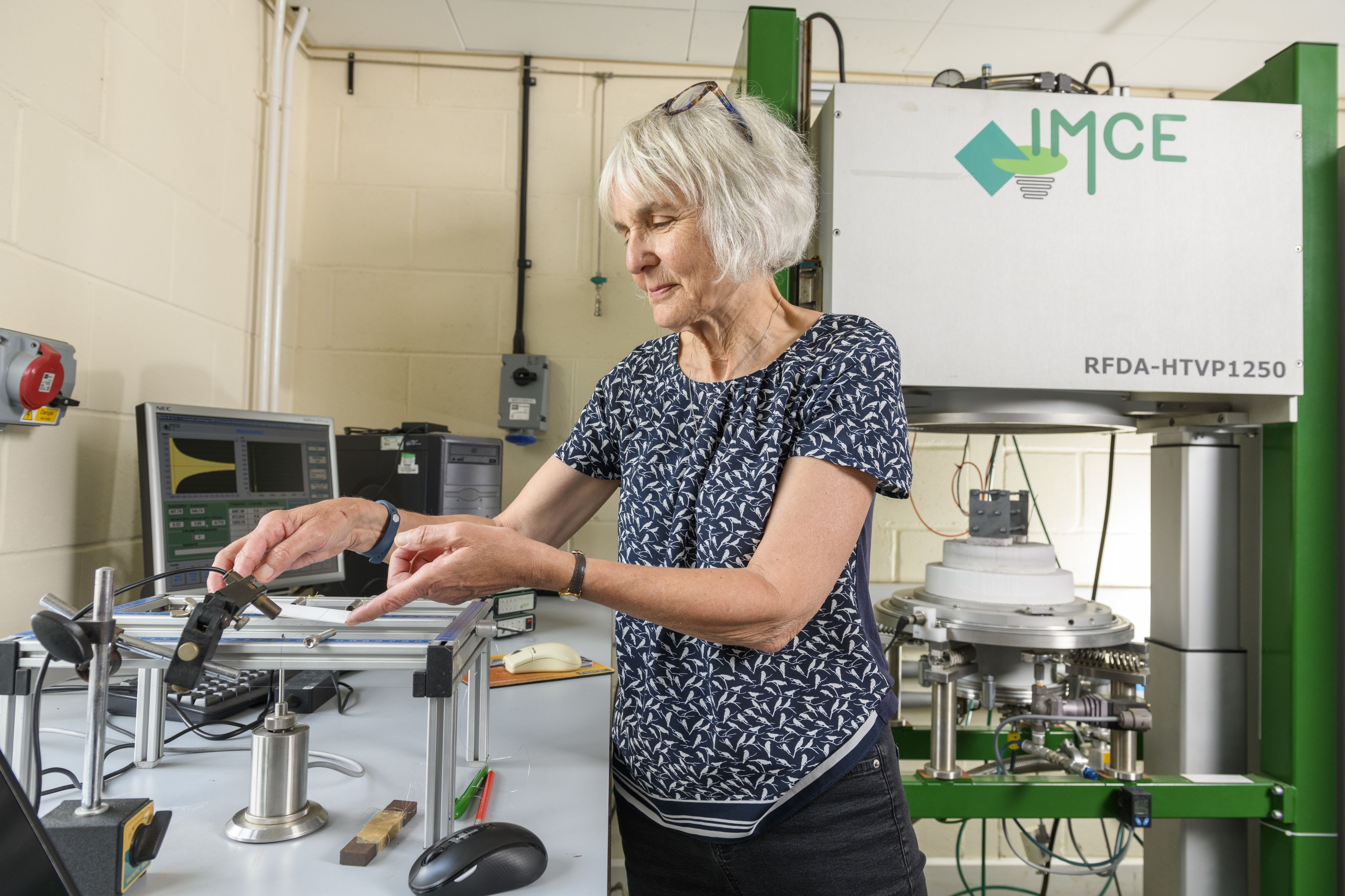An interview with Dr Christine Chalk who retired this month from Royce at Cranfield University

Dr Christine Chalk is Senior Research Fellow in the Department of Manufacturing and Materials at Cranfield University and is the Technology Platform Lead: Coatings for Extreme Environments for the Royce at Cranfield. She came to Cranfield in 2006, initially joining the National High Temperature Surface Engineering group as a technical member of staff, gaining wide experience of the field and then moving into research and academic positions.
Christine is retiring from her role this month and we spoke to her, and to some of her colleagues from the Surface Engineering and Precision Centre, about her career highlights and some of her personal and professional impacts.
Hi Christine, thanks for talking to me! First question, can you tell me a bit about your current role and your field of expertise?
I work in the Surface Engineering and Precision Centre at Cranfield. My role focuses on coatings - the deposition of coatings for use in extreme environments, so this may include high temperatures, up to 1400°C, or exposure to other damage such as wear or chemical attacks. We design, tailor, deposit and test highly engineered coatings. So very often it's not just a single layer, it may be a multi-layer or multi-material coatings to enable a component to operate in extreme environments.
I mainly work with Rolls Royce, in particular on the gas turbine part of their engines, but part of my time is also working with other industries
What has been your career path up to your current role?
After my PhD and I took up a position with a company called Fulmer Research, which was an independent research organisation. This was back in the 70s / 80’s and I worked there for over 10 years. I was working on heat storage media for storage radiators and also in high temperature coatings for rocket thrusters. So quite a challenging environment and, to be honest, the science hasn't moved on that much in in the latter case. After that I raised a family and took up various part time roles.
After that, I fell into further education and was teaching numeracy, literacy and IT to post 16’s who had struggled with school or had left school without a formal qualification as their lives very often were very challenging. That was a huge learning experience and I got my post 16 teaching qualifications at that time.
I then saw a job advertised at Cranfield and came here initially as a member of technical staff and then gradually I became a researcher and I am now a senior research fellow here.
Over your time at Cranfield, what would you say is your career highlight or what are you most proud of achieving?
In many cases, I would say getting patent or patent applications with industry because that is a real measure of success. It isn't just a one-off experiment in the lab, it’s that there is some mileage in your work and that industry can see that.
Very often the patents have come about because three years previously you shared some results that didn't seem to agree with what you might expect. But you shared them, tried to understand why they came out like this and then the seed of an idea began to form.
So, I think just noticing details and then seeing that there is a benefit to them.
You have worked at Cranfield for over 18 years now, what would you say has been your favourite thing about working here?
It’s definitely the people and the students and the fact that so many people go the extra mile to help.
I know you have been working with the Royce Institute at Cranfield for the last 2-3 years as well. Could you tell me about some of the most interesting projects or questions that you've had to tackle in that time?
I think it has been applying the coatings we can produce in different scenarios and seeing new opportunities for their exploitation. People turn up with different materials requiring special coatings and we try to help them
And again, it's the conversations we've had with people that have been great. We had a super student come from Manchester who was really entertaining. He'd started off doing an English literature degree, then got a job as an apprentice and worked his way up and there he was doing a PhD. He reached out to us to help him test some of his material systems and that was very rewarding.
Is there anything you wish you could have finished or or found out the answer to over your career?
That's a tricky one. Cranfield have just embarked on big programme on sustainable aviation. I think in the past we've been quite conservative in our exploration and exploitation of material systems with which we are reasonably familiar, but now we've just been given the opportunity to push the boundaries a lot more.
One of the driving forces for being more sustainable is to increase the efficiency of an engine, so either you can run it hotter, which has the advantage that it's a cleaner burn, or you can operate it for longer, which means that it is more sustainable. This project will look at ways to do this. And of course, we are not only talking about using sustainable aviation fuels, which are already in operation in relatively small quantities, but moving on to hydrogen. There will definitely be opportunities to see whether the types of coating systems we work with would be valid if we're combusting hydrogen in place of hydrocarbon fuels. I think that would be really exciting to work on and see through to the end but is something to hand over to the next generation of scientists and engineers.
Your colleague Luis Isern Arrom will be taking over your role. I know you've had a long time working together so he will know exactly what needs to happen, but do you have any advice that you could offer to your successor?
There are lots of demands and everything is urgent, whether it's students or delivering a project, and they're all time constrained so an important thing to do is to prioritise and sometimes saying no. We need creative solutions for today’s challenges and these can take time to mature.
What plans do you have for your retirement?
Well, we have two grandchildren already and about to have a third. Clearly, I will be spending more time with the family. We have an old house and a large garden. I'm very interested in gardening and I want to be more scientific, moving forward!
I'm also thinking about things like the University of the Third age, local history, geology, wildlife and I love walking. So, yes, I think, I will be quite busy!
Thank you for your many contributions and best of luck for your retirement Christine!
Keep scrolling...
We asked some of Christine's colleagues from the Surface Engineering and Precision Centre for their thoughts on her personal and professional impact to them...

"I met Christine 10 years ago, when I started my PhD at Cranfield. She has always had time for students to help us on health and safety practices, offer scientific advice, or just have a chat. It doesn’t take long to realise she is one of the kinder and more caring persons you can ever meet. After my graduation, she became my mentor, manager, and friend for the past 7 years. I have learned a lot from her: scientific rigour, to work safely, to help others and ask for help, that there are no silly questions, and to learn from our students.
Her contribution to materials and surface science is immense. She is a great chemist that has worked in many materials challenges, perhaps I would highlight her contribution to shaping the current and next generations of Thermal Barrier Coatings, a key thermal protection system that can be found in any modern aircraft engine, through her work with Professor John Nicholls and Rolls Royce."
“Christine was my supervisor as part of my MSc back in 2016 and again for almost 5 years during my EngD (2019-2024). It was a privilege to work with Christine, as she made the people working with her feel valued and part of a team. I would highlight the scientific rigour with which she always approached reviewing my work, as well as her own.
On a more personal level, Christine was very supportive and understanding when personal circumstances clashed with work commitments. She also made a point of recognizing others for their work and where possible, rewarding their efforts. I count myself lucky to have worked with her on very exciting projects, which I think have been quite successful despite the significant challenges, in no small part thanks to Christine keeping the effort focused. She will be missed and I hope she enjoys her retirement.”
“One of Christine’s many significant influences on the Centre has been her natural, caring human nature. In a working environment dominated by scientists and engineers, who can have very focused personalities; it has been a huge bonus to have a team member who exhibits not just care about her own work activities, but also that of others, and who shows great empathy to all staff and students.
On a scientific level, Christine’s chemistry background is one of her additional attributes that is going to be missed. Having worked at Fulmer Research and having a keen understanding and interest in Chemistry has proven to be a great asset. She has been the go-to advisor for many of the team and she would always give some of her time to assist with enquiries and problems as much as was able.”
